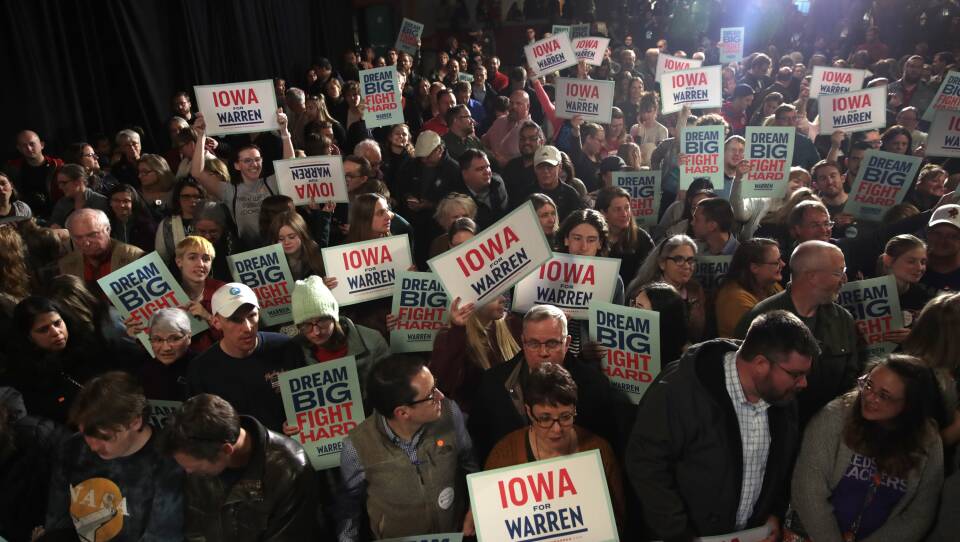The Iowa caucuses are less than one month away, and many Democratic candidates for president have been visiting the state to garner support for their campaigns. WGBH News Morning Edition host Joe Mathieu spoke with Iowa Public Radio political reporter Kate Payne about what voters are thinking as part of a weekly segment leading up to the caucus. The transcript below has been edited for clarity.
Joe Mathieu: So candidates like Elizabeth Warren have been in your backyard for the better part of a year. When you talk to voters, do they feel like they're getting to know the candidates?
Kate Payne: It does vary somewhat. Many Iowans here have been, you know, deep in this Iowa caucus cycle, as you said, for over a year. But some still are just checking into the process. I think in this cycle in particular we are starting to hear from some people who maybe were tired of politics in the past few years, but are being energized by this cycle. I spoke with somebody this weekend in the city of Dubuque, Iowa. This was a woman who's about in her early 60s, and she said that she actually sat out in 2016. She didn't participate in the election, she just was was tired of politics. But she said that something about Warren and something about this cycle has brought her back in. This individual lives in a trailer park, and she's seen her rent go up astronomically. And she said that she just felt like Warren identified with her experience of being a divorcée, raising her kids on her own for a time, and they just had that connection. So she's committed to caucus for her.
Mathieu: So it could be a story of evolving demographics once we pick through the votes after this is all done in Iowa. Kate, of course, it's not just a matter of picking a single candidate in a caucus. And I want to ask you about that. It looks like there could be as many as three or four frontrunners from at least what we are reading. Are you asking people about their second or third choices? Because that's the way this might go.
Payne: Yes, absolutely. So that is so key about the caucus process in particular, which folks in primary states may not always remember, because when Iowa caucus goers go to their precinct locations they are going to be picking their initial first choice candidate in the room on caucus night. But if that candidate doesn't get 15 percent of the support in the room, those folks can choose somebody else. And so in that second choice, sometimes third choice option, you really can see some of these candidates make all the difference. That was something that we saw in 2008 with Barack Obama. On those second choices people overwhelmingly were moving to him, not Hillary Clinton [and] not somebody like Joe Biden. That was something that really took him over the edge and put him on the road to the White House. So absolutely, we're asking folks who's in your top two, three or four because those really could matter.
Mathieu: So does it feel chaotic then, as a result? Or is just is this just the name of the game in Iowa?
Payne: As far as the size of the field this year, I think that is something that is to some extent overwhelming folks. There are so many to choose from, but still there are clear tiers. There are lots of folks for Iowans to choose from and a lot happening in the world right now for them to try and and make their decision.
Mathieu: Well, that's for sure. I do wonder not just where you are, but where we are with regard to the New Hampshire primary, how all the news from Iran could potentially impact what's going to happen in the weeks ahead. But you're in Iowa City, correct?
Payne: Yes.
Mathieu: Are the candidates spending most of their time in the population centers like Iowa City or Des Moines, or are they out in the middle of nowhere driving through cornfields to knock on doors?
Payne: It's all of the above here. So certainly candidates are hitting some of those key cities of Des Moines, Iowa City, Davenport, Dubuque, Sioux City [and] Mason City, but also communities of a couple thousand — 2,000 people [and] 5,000 people. But we're also seeing a lot of candidates focus on eastern Iowa counties along the Mississippi River that have lower populations. Many of those counties went for Donald Trump in 2016. Democrats don't want to take anybody for granted.
Mathieu: You certainly have to do a lot of driving to win Iowa. This much we know. Kate, is it fair to ask, have you seen Deval Patrick much in Iowa? He was, of course, a very late entry, our former governor here in Massachusetts. [He] appears to be focusing a lot on New Hampshire, but I wonder if he's making a dent out there.
Payne: So we saw him once, by my count. I'm thinking back if he's come back since then, but I think it's just been the one visit. He came to Cedar Rapids right after he announced and that was the question that I posed to him: How often are you going to be in the state of Iowa? What's your approach here? And he said that he wouldn't take the state for granted, but we haven't seen him back since. [He] certainly has been focusing more on his neck of the woods, where his political experience is.
Mathieu: You know what they say in New Hampshire, it's not that voters expect to meet all of the candidates, it's a question of how many times they meet the candidate. And I'm guessing that goes for Iowa, too.
Payne: Absolutely. There's always that expectation. Iowans want to see them multiple times, maybe even shake their hand.





